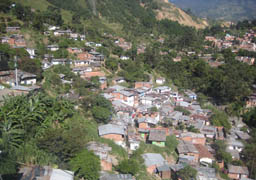

Around the world over the last four centuries there has been a massive shift in the ownership of land.
This began in Europe and particualrly Britain at the foundations of the modern capitalist period with the land enclosures of the commons. Suddenly peasants found the village commons where they had grazed their flocks for centuries being enclosed by fences put up by the feudal lords who had grants to the land from the crown or the church. In frighteneing episodes across England since the sixteenth centrury, and culminating in the mid 1800's, the people of England were finally dispossessed by the aristocracy and forced by the economic results to migrate to the cities where the emergence of the mills provided an opportunity to live - but no longer to be a person in community connected to the land. Identity was transformed by alienation. urban poverty and slumsabounded. Many escaped to the new world of the United States, Canada, New Zealand and Australia, where they could find new land in a new land.
Traditional land rights are described by Francis Fukuyama in Melanesia: "under customary land tenure,property is private, but held informally (that is with no legal documentation) by groups of kinfolk, who have both individual and collective rights to different strips of land. Property has not only an economic but also a spiritual significance, since dead relatives are buried at certain spots on the land, and their spirits continue to inhabit that place. No-one in the wantok, including the Big Man, has the exclusive ritht to alienate title to the land to an outsider. A mining or palm oil concession has to negotiate with hundreds and sometimes thousands of landowners , and there is no statute of limitations on land claims under tradtiional rules."
The land was once the source of identity. Now it became a commodity. And in the city even more so as the closer to the centre, the greater its value as a commodity. The birthing of the great capitalist epoch has not mitigated this process, but acelerated it as it became global capitalism.
Yet dispossession, homelessness, alienation, community breakdown we sense inherently are evils. The Filipinos have a saying, "how can we be squatters in our own land?" referring to a 200 year old law that dispossessed the whole nation, giving the land to 400 Spanish families. And the scriptures confirm what we know in our own spirits.
Thus, we rise up against the very roots of modern and global capitalism, with moral indignation at the lack of capacity of cities to provide land for ownership. Yet we have to work within the framework of existing systems. Marxism with ownershp by the people failed, attempts at communcal socialism have not created sustainable mechanisms. We are left with individual land rights as the only option in the city.
Which leads to the quetion of how do we create pathways to give access for all to these? this course highlights the problems and many of the responses.

Read the first section on types of tenure in UNHabitat. : Chapter 4. Land tenure systems and squatter settlements
A Comparative Study In Municipal Land Management in Asia